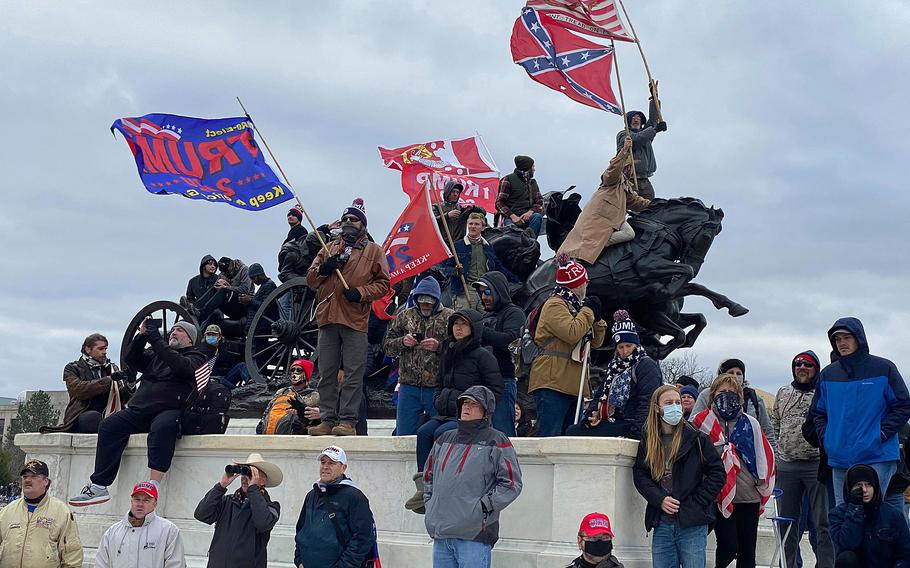Opinion
Extremism in the US military remains dangerous threat even though DOD-commissioned report downplays it
Special to Stars and Stripes February 27, 2024

Rioters storm the Capitol in Washington, D.C., on Jan. 6, 2021. A recent study by the Institute for Defense Analyses found that there is no evidence to support the notion that violent extremism is widespread in the U.S. military, though extremism may be rising among veterans. (Robert H. Reid/Stars and Stripes)
A report commissioned by the Pentagon in 2021 and released quietly with little notice in December 2023 did not put to rest a fear that the military is full of violent extremists. The Institute for Defense Analyses found “no evidence that service members were charged at a different rate than the members of the general population.” In addition, the study concluded that there are “fewer than 100 substantiated cases per year of extremist activity by members of the military.”
This is a low bar that could prove extremely dangerous. The U.S. military needs high standards for people who enlist, including vetting and retraining. They should not focus intensely on enlisters who have conservative political views — but on extremists who commit violent actions.
Concern over extremism in the military skyrocketed following the events of the Jan. 6, 2021, insurrection that prompted the investigation. Defense Secretary Lloyd Austin ordered a 60-day stand down within the first month of the Biden administration to discuss extremism in the ranks across the Defense Department. Sixty-five Democrats sent a letter in July 2023 asking what steps the Department of Homeland Security was taking to weed out domestic extremists within their department after reports that 300 current or former employees were found to be members of the right-wing Oath Keepers group and working with conservative militia groups at the U.S.-Mexico border.
In total, 178 active and former military members were arrested in connection to Jan. 6. The IDA report found that “extremist organizations have been known to target veterans as they separate from service and transition to civilian life. Former service members can be particularly vulnerable to extremist organizations that appear to offer a continuation of the camaraderie and shared identity and connectedness that individuals experienced while serving in uniform.”
No attacks involving military extremism have been as deadly as the 1995 bombing of the Alfred P. Murrah Federal Building in downtown Oklahoma City that killed 168 people. The attack was carried out by Army veteran Timothy McVeigh, who was later convicted and sentenced to death in June 1997.
The report included that the system of granting security clearances to personnel is “outdated and inadequate” and if it is not updated, the Pentagon “remains at risk of unknowingly permitting persons who may have engaged in violent extremist conduct to enter and encumber privileged positions as civilian employees or contractors in the military community.” Similar to police to protect against abuse, this lesson should be used within the military to vet out extremism.
It was only last April when Jack Teixeira, a member of the Massachusetts Air National Guard, was arrested and charged with posting sensitive classified information on the war in Ukraine to members of a server on the social media platform Discord. CNN reported at the time of his arrest that Teixeira wanted to “kill a [expletive] ton of people” because it would be “culling the weak minded,” and discussed wanting to make a minivan into an “assassination van.”
If the Pentagon believes extremism is not something the nation should worry about, they are letting their guard down as well as putting the safety of U.S. citizens in jeopardy.
Robert Weiner was a spokesman in the Clinton and George W. Bush White Houses. He was communications director of the House Government Operations Committee, and senior aide to retired four-star Army Gen. and Drug Czar Barry McCaffrey and Reps. John Conyers, Charles Rangel, Claude Pepper and Ed Koch. Ben Kearney is a policy analyst and writer at Robert Weiner Associates and Solutions for Change.